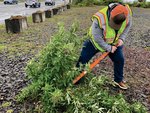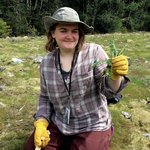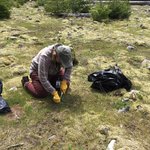


As the weather warms and people start heading outside, the Lewis County Noxious Weed Control Board hopes they will help keep an eye out for problem weeds causing issues in the community.
Steps can be as simple as walking your property, spotting problem plants in public areas or even cleaning your boat and fishing gear. But each of these can have a big impact on the overall health of the environment and economy.
“Noxious weeds specifically require people to work together across property lines and jurisdiction,” said Lewis County Noxious Weeds Control Board Program Coordinator Charles Edmonson. “If one person is allowing them to spread, they can affect everyone.”
In Washington, control of the spread of noxious weeds is the legal responsibility of property owners. The Lewis County Noxious Weed Control Board is created and governed by the greater Washington State Noxious Weed Control Board as laid out in Revised Code of Washington 17:10. According to the RCW, property owners can actually receive civil infractions and fines up to $1,000 for not curtailing the growth of noxious weeds.
“Noxious weeds is a legal term,” Edmonson explained. “It has to be on the list. We have our own county list but a lot of it is handed down to us from the state.”
The reason the state has weed control laws dating back to 1881 is that if left unchecked, invasive weeds can cause actual financial damage. It is estimated that annually in Washington noxious weeds have a direct impact of $239.5 million on crops, $120.1 million on livestock, $124.8 million on timber and $20.5 million on recreational activities such as hunting, fishing and boating.
In Lewis County where timber and agriculture flourish, they can be particularly devastating. A patch of tansy ragwort growing near grazing lands can kill cattle. A few Scotch broom weeds allowed to flourish near a Christmas tree farm can quickly muscle out young trees.
“No one wants poison hemlock in their hay. No one wants tansy getting to their cows. It takes a community to make sure this doesn’t happen,” Edmonson said.
Kela Hall-Wieckert, of the Lewis County Noxious Weed Control Board, said homeowners can also suffer if noxious weeds spread. She noted that invasive plants can hasten soil erosion, creating nightmares for homeowners along river banks.
“If you have knotweed next to your house, it can affect your foundation,” Hall-Wieckert said. “And if it’s next to your septic system, it can get into it and cause all kinds of problems.”
Treatments for knotweed were carried out along the Chehalis River in 2018 and the Cowlitz River in 2014. Hall-Wieckert said they are starting to ramp up plans for more knotweed treatments soon.
Noxious weeds are classified into three categories in Washington. Landowners are required to completely remove all Class A weeds from their property. There are currently 37 Class A weeds which include: milk, slenderflower, Turkish and Italian thistle; Kudzu; clary sage; variable-leaf milfoil; Vochin Knapweed; and smooth and salt meadow Cordgrass. Landowners may be required to control Class B and C weeds depending on how widespread it is in each county. In Lewis County, the noxious weed control board adopts a county weed list each spring that delineates which weeds are high priority.
In Lewis County, the Class B weeds targeted for education and enforcement are Brazilian elodea, diffuse knapweed, meadow knapweed, purple loosestrife, spotted knapweed, spurge laurel, velvetleaf, wand loosestrife, wild chervil, yellow nutsedge, Bohemian knotweed, butterfly bush, Eurasian watermilfoil, giant knotweed, parrotfeather, poison-hemlock, Scotch broom and tansy ragwort. Edmonson said tansy ragweed, Scotch broom, poison hemlock and knotweed tend to be some of the most concerning plants in Lewis County, as well as the poisonous Italian Arum, which he said some people actually plant on purpose
“We try and offer as much assistance as we can and education but, obviously, at some point there is a legal obligation,” Edmonson said.
Danika Davis, weed specialist, said their office wants to work with landowners to stop the spread of noxious weeds and offers resources to make the effort a bit easier. Staff from the Lewis County Noxious Weed Control Board will do site visits to help landowners identify what noxious weeds they have and the best methods to eradicate them. They also interact with the public via social media, offering identification of weeds through photos. The office offers a growing list of tools that can be loaned to residents, such as a weed wrench for pulling up Scotch broom by the roots, and will soon be offering backpack sprayers and injectors for targeted poisoning of knotweed. Each year, the Noxious Weed Control Board also offers a Stewardship Incentive Program that can help reimburse property owners for the cost of controlling noxious weeds. Twenty-one local property owners were chosen this year for the program, which will pay out a total of about $10,000 in reimbursements.
The Lewis County Noxious Weed Control Board also offers weed-free certification for hay and mulch for those selling these agricultural products. This designation through the Washington state Department of Agriculture is now required for all products used on U.S. Forest Service lands nationwide and is becoming a more common requirement in order to transport these products across state lines.
“That’s a great way for people to make more money off their products,” Edmonson said.
The Noxious Weed Control Board also makes appearances at local events to educate the public how they could be spreading noxious weeds without knowing it. For instance, Scotch broom seeds can stay viable in the dirt for 60 to 80 years, which means that property owners can also see an explosion of noxious weeds when they clearcut an area or disturb the ground in any major way. And waterbound weeds such as milfoil can hitch a ride on boat propellers, so cleaning your boat thoroughly between trips can cut down on choked waterways, as can refraining from emptying your fish tank into local bodies of water. And when you’re working in the garden, make sure noxious weeds don’t make it into the compost pile where they may still spread seeds.
Mid-summer when everything is in bloom is when the Lewis County Noxious Weed Control Board usually fields the most calls from landowners wanting help identifying and dealing with invasive species on their property. But the best time to start the process is spring or early summer when weeds are just beginning to pop up out of the ground and many have not yet flowered or gone to seed. It’s important to understand what kind of noxious weeds they have and to use the best-known methods for killing it. For instance, many people like to mow down noxious weeds but sometimes that can make them spread even further.
“(Edmonson) likes to say there is no silver bullet,” Davis said with a laugh of how to deal with noxious weeds.
“It’s never that simple,” Edmonson added. “No weed gets on this list without being very difficult to kill.”
For More information
Lewis County Noxious Weed Control Board: Lewiscountywa.gov/departments/weed-control/ or Lewis County Noxious Weed Control on Facebook
Washington State Noxious Weed Control Board: nwcb.wa.gov
Revised Code of Washington 17:10 regarding Noxious Weeds can be viewed at app.leg.wa.gov/RCW
Free Tansy Dropoff
The Lewis County Noxious Weed Control Board will be holding free tansy dropoff days. Property owners can bring bagged tansy ragwort (no loose tansy will be accepted) and the board will cover the disposal fees.
Dropoffs will be:
East Lewis County
Friday June 17
Randle
Randle Fire Station District #14
9978 U.S. Highway 12
9 a.m. to 10:30 a.m.
Morton
Morton Junior/Senior High School
152 Westlake Ave.
11 a.m. to 12:20 p.m.
Onalaska
Onalaska Fire Station District #1
244 Carlisle Ave.
1 to 2:30 p.m.
West Lewis County
Saturday June 18
Pe Ell
St. Joseph Church
416 N Main St.
9 to 10:30 a.m.
Toledo
Toledo ball fields
5545 Jackson Highway
noon to 1:30 p.m.
Centralia
Centralia Christian School
1315 S Tower Ave.
2 to 3:30 p.m.